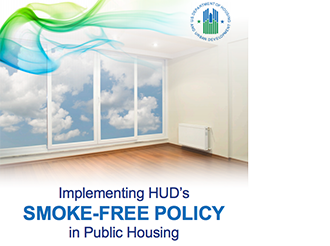At the end of 2016, the U.S. Department of Housing and Urban Development (HUD) announced a new rule that protects and promotes the health and safety of residents in public housing.
Public housing developments are now required to implement smoke-free policies. The policy became effective in February 2017, and public housing agencies (PHAs), including Tribally Designated Housing Entities (TDHEs), must have implemented a smoke-free policy by July 31, 2018.
The goal of the smoke-free policy is to help PHA homes to be safer and healthier for residents and employees. Eliminating secondhand smoke that can travel between public housing units is an important step towards improving the health of residents.
In addition, PHAs will have an easier time maintaining and turning over units and will likely see reduced maintenance costs.
We asked Travois Asset Management and Compliance Director Mike Price for additional details and clarification of the policy.
The smoke-free policy bans the use of prohibited tobacco products in all public housing living units, indoor common areas in public housing, in PHA administrative office buildings and in Indian Housing activities. The smoke-free policy also extends to all outdoor areas up to 25 feet from the public housing and administrative office buildings.
1. What are the prohibited tobacco products? The prohibited products are cigarettes, cigars, pipes and water pipes — items as that involve the ignition and burning of tobacco leaves.
The use of electronic nicotine delivery systems — also called e-cigarettes — is not prohibited under the new rule. PHAs have the flexibility to prohibit or allow e-cigarettes in their individual smoke-free policies.
2. What are “common areas” as defined by the policy? Common areas include: hallways, rental and administrative offices, community centers, day care centers, laundry centers, and similar structures.
When writing a policy, PHAs can restrict smoking to outdoor Designated Smoking Areas (DSAs), create additional restricted areas — like near a playground — or make their entire grounds smoke-free.
3. What policies are involved in providing DSAs for residents? To accommodate smoking residents, PHAs can create DSAs, though it is not required under the smoke-free policy. The DSA must be outside of restricted areas, may include partially enclosed structures and should include suitable safety features — appropriate seating and shade and must be accessible for persons with disabilities. PHAs can include DSA funding in future capital-needs planning. PHAs without enough space may work with the community to identify nearby public areas where residents may smoke safely.
PHAs are required to document their smoke-free policies in PHA plans and include the ban in a tenant’s lease, which may be done through an amendment process or as tenants renew their leases annually.
4. Can you further explain implantation needs? Board approval is required when creating PHA smoke-free policies. If the new policy constitutes a significant amendment, the PHA must conduct public meetings according to standard amendment procedures.
5. What changes need to be made to tenant leases? All resident leases need to be amended, and all of your residents must sign the lease amendment as a condition of their continuing occupancy. Your residents should be notified of the written revision to an existing lease at least 60 days before the revision is to take place. Amendments should also note the availability and location of any designated smoking areas.
This rule improves indoor air quality in the housing, benefits the health of public housing residents, visitors, and PHA staff, reduces the risk of catastrophic fires, and lowers overall maintenance costs.
6. Are there other suggestions for PHAs when implementing the new policy? PHAs should post signs that reference the new smoke-free policy. These signs must be accessible to all residents and visitors (including persons with disabilities) and must be posted in multiple languages. It’s also a great idea to use multiple communication methods — letters, flyers, seminars, etc. — to share this information with your residents.
7. Is funding available to implement the smoke-free policy? The costs of implementing smoke-free policies may be covered through operating reserves and eligible capital fund activities. PHAs may request insurance premium allowances from their insurance providers after implementing smoke-free policies due to decreased fire risk.
8. What enforcement and monitoring advice do you have? A tenant’s lease and your amended PHA Plan are your primary policy enforcement mechanisms. PHAs must enforce smoke-free policies when a resident is in violation, must provide due process, and must allow residents to exercise their right to an informal settlement process and a formal hearing.
PHAs may not evict a tenant for a single incident of violation of a smoke-free policy. By adopting a graduated enforcement framework that includes escalating warnings with documentation to the tenant file, PHAs can take specific, progressive monitoring and enforcement actions, while educating tenants and providing smoking cessation resources, prior to pursuing tenant eviction for smoke-free policy violations.
9. Final thoughts? PHAs, with good cause, may request waivers. In most cases, any religious or cultural uses would be permitted, and the PHA or TDHE could write these into their policies.
PHAs are also encouraged to partner with outside organizations for cessation support for their residents. Medicaid recipients may be eligible to receive financial assistance for cessation services and prescription cessation medications depending on the state Medicaid program. Residents and PHAs may also contact national quit lines (1-800-QUIT-NOW) and community health centers to ask what services are available.
Read more about HUD’s smoke-free policy on its website and through the Office of Public and Indian Housing notice.
If you have any questions, please feel free to email us at assetmanagement@travois.com or call us at 816-994-8970.


